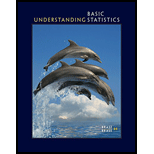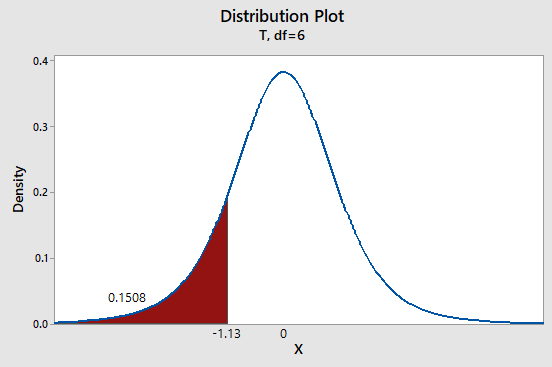
Concept explainers
The verification of
Explanation of Solution
To find the required statistics using the Minitab, follow the below instructions:
Step 1: Go to the Minitab software.
Step 2: Go to Stat > Basic statistics > Display
Step 3: Select dataset ‘Field A’ and dataset ‘Field B’ in variables.
Step 4: Click on OK.
The obtained output is:
Statistics
| Variable | N | N* | Mean | SE Mean | StDev | Minimum | Q1 | Median | Q3 | Maximum |
| Sample 1 | 7 | 0 | 4.000 | 0.900 | 2.380 | 2.000 | 2.000 | 3.000 | 6.000 | 8.000 |
| Sample 2 | 8 | 0 | 5.500 | 0.982 | 2.777 | 2.000 | 3.000 | 5.500 | 7.750 | 10.000 |
From the above output we have find that the values of
(a)
(i)
The level of significance, null hypothesis and alternate hypothesis.
(a)
(i)
Answer to Problem 22P
Solution: The hypotheses are
Explanation of Solution
The level of significance is 0.05.Since, we want to conduct a test of the claim that population mean time lost due to stressors is greater than the population mean time lost due to intimidators. Therefore the null hypothesis is
(ii)
To find: The sampling distribution that should be used along with assumptions and compute the value of the sample test statistic.
(ii)
Answer to Problem 22P
Solution: We can use student’s t distribution. The sample test statisticis
Explanation of Solution
Calculation:
Let’s assume that the population distributions of time lost due to intimidators and time lost due to stressors are each mound shape and approximately symmetrical. The population standard deviation (
Using
The sample test statistic t is calculated as follows:
Thus the test statistic is
(iii)
To find: The P-value of the test statistic and sketch the sampling distribution showing the area corresponding to the P-value.
(iii)
Answer to Problem 22P
Solution: The P-value of the sample test statistic is 0.1508.
Explanation of Solution
Calculation:
The given hypothesis test is two tailed.
D.F = Smaller of
By using table 4 from Appendix
Graph:
To draw the required graphs using the Minitab, follow the below instructions:
Step 1: Go to the Minitab software.
Step 2: Go to Graph > Probability distribution plot > View probability.
Step 3: Select ‘t’ and enter D.f = 6.
Step 4: Click on the Shaded area > X value.
Step 5: Enter X-value as -1.13 and select ‘Left tail’.
Step 6: Click on OK.
The obtained distribution graph is:

P-value = 0.1508
(iv)
Whether we reject or fail to reject the null hypothesis and whether the data is statistically significant for a level of significance of 0.05.
(iv)
Answer to Problem 22P
Solution: The P-value
Explanation of Solution
The P-value (0.1508) is greater than the level of significance (
(v)
The interpretation for the conclusion.
(v)
Answer to Problem 22P
Solution: There is not enough evidence to conclude that population mean time lost due to stressors is greater than the population mean time lost due to intimidators.
Explanation of Solution
The P-value (0.1508) is greater than the level of significance (
(b)
To find: The 90%confidence interval for
(b)
Answer to Problem 22P
Solution:
The 90% confidence interval for the difference of two means is
Explanation of Solution
Calculation:
The critical t-value for a two-tailed area of 0.10 is 1.943.
The difference of two means is
Now, the margin of error is computed as follows:
Now the confidence interval for the difference of two means;
The confidence interval for the difference of two means is
Interpretation:
At the 90% confidence level, we see that the difference of means
Want to see more full solutions like this?
Chapter 10 Solutions
Understanding Basic Statistics
- I need help with this problem and an explanation of the solution for the image described below. (Statistics: Engineering Probabilities)arrow_forwardI need help with this problem and an explanation of the solution for the image described below. (Statistics: Engineering Probabilities)arrow_forwardDATA TABLE VALUES Meal Price ($) 22.78 31.90 33.89 22.77 18.04 23.29 35.28 42.38 36.88 38.55 41.68 25.73 34.19 31.75 25.24 26.32 19.57 36.57 32.97 36.83 30.17 37.29 25.37 24.71 28.79 32.83 43.00 35.23 34.76 33.06 27.73 31.89 38.47 39.42 40.72 43.92 36.51 45.25 33.51 29.17 30.54 26.74 37.93arrow_forward
- I need help with this problem and an explanation of the solution for the image described below. (Statistics: Engineering Probabilities)arrow_forwardSales personnel for Skillings Distributors submit weekly reports listing the customer contacts made during the week. A sample of 65 weekly reports showed a sample mean of 19.5 customer contacts per week. The sample standard deviation was 5.2. Provide 90% and 95% confidence intervals for the population mean number of weekly customer contacts for the sales personnel. 90% Confidence interval, to 2 decimals: ( , ) 95% Confidence interval, to 2 decimals:arrow_forwardA simple random sample of 40 items resulted in a sample mean of 25. The population standard deviation is 5. a. What is the standard error of the mean (to 2 decimals)? b. At 95% confidence, what is the margin of error (to 2 decimals)?arrow_forward
- mean trough level of the population to be 3.7 micrograms/mL. The researcher conducts a study among 93 newly diagnosed arthritis patients and finds the mean trough to be 4.1 micrograms/mL with a standard deviation of 2.4 micrograms/mL. The researcher wants to test at the 5% level of significance if the trough is different than previously reported or not. Z statistics will be used. Complete Step 5 of hypothesis testing: Conclusion. State whether or not you would reject the null hypothesis and why. Also interpret what this means (i.e. is the mean trough different from 3.7 or noarrow_forward30% of all college students major in STEM (Science, Technology, Engineering, and Math). If 48 college students are randomly selected, find the probability thata. Exactly 12 of them major in STEM. b. At most 17 of them major in STEM. c. At least 12 of them major in STEM. d. Between 9 and 13 (including 9 and 13) of them major in STEM.arrow_forward7% of all Americans live in poverty. If 40 Americans are randomly selected, find the probability thata. Exactly 4 of them live in poverty. b. At most 1 of them live in poverty. c. At least 1 of them live in poverty. d. Between 2 and 9 (including 2 and 9) of them live in poverty.arrow_forward
- 48% of all violent felons in the prison system are repeat offenders. If 40 violent felons are randomly selected, find the probability that a. Exactly 18 of them are repeat offenders. b. At most 18 of them are repeat offenders. c. At least 18 of them are repeat offenders. d. Between 17 and 21 (including 17 and 21) of them are repeat offenders.arrow_forwardConsider an MA(6) model with θ1 = 0.5, θ2 = −25, θ3 = 0.125, θ4 = −0.0625, θ5 = 0.03125, and θ6 = −0.015625. Find a much simpler model that has nearly the same ψ-weights.arrow_forwardLet {Yt} be an AR(2) process of the special form Yt = φ2Yt − 2 + et. Use first principles to find the range of values of φ2 for which the process is stationary.arrow_forward
 Glencoe Algebra 1, Student Edition, 9780079039897...AlgebraISBN:9780079039897Author:CarterPublisher:McGraw Hill
Glencoe Algebra 1, Student Edition, 9780079039897...AlgebraISBN:9780079039897Author:CarterPublisher:McGraw Hill College Algebra (MindTap Course List)AlgebraISBN:9781305652231Author:R. David Gustafson, Jeff HughesPublisher:Cengage Learning
College Algebra (MindTap Course List)AlgebraISBN:9781305652231Author:R. David Gustafson, Jeff HughesPublisher:Cengage Learning

